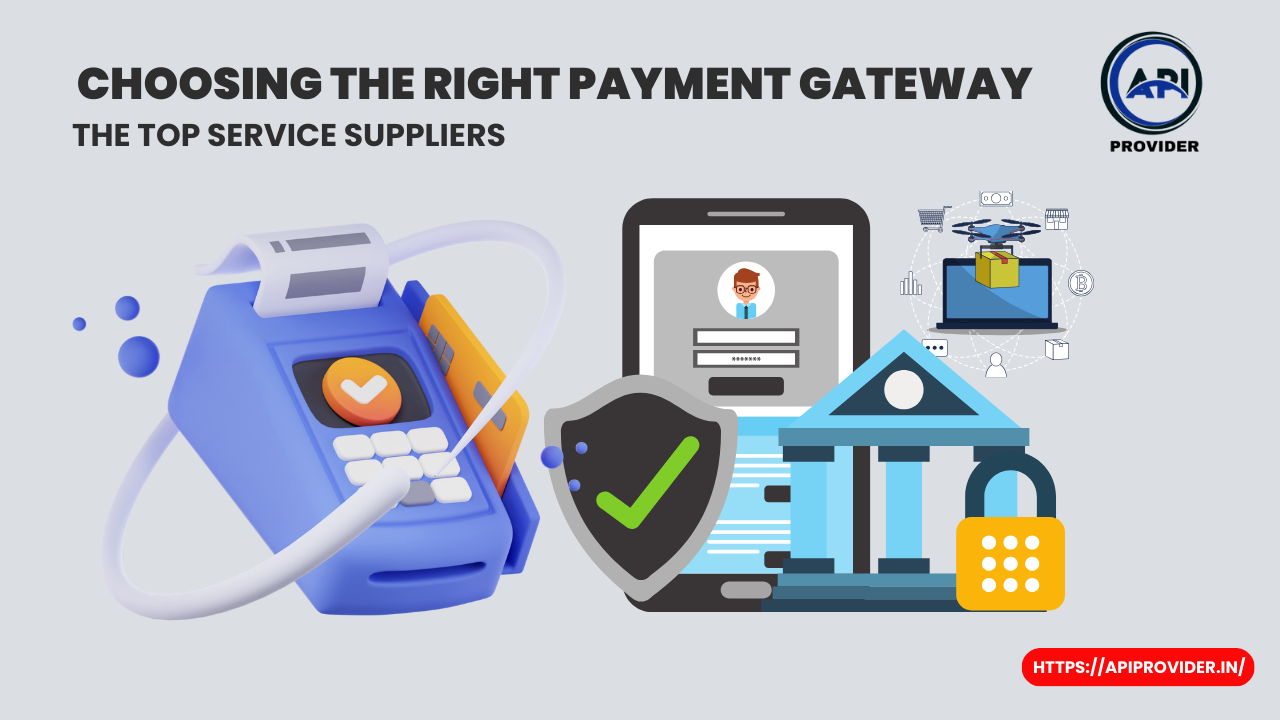Choosing the Right Payment Gateway: In today’s digital economy, selecting the right payment gateway is crucial for any business that wants to thrive online. A payment gateway not only facilitates transactions but also ensures they are secure, swift, and seamless. With so many options available, how do you make the right choice? This article will guide you through the essentials of payment gateways and review the top service suppliers to help you make an informed decision.

Understanding Payment Gateways
What is a Payment Gateway?
A payment gateway is a technology used by merchants to accept debit or credit card purchases from customers. It acts as an intermediary between the customer and the merchant, encrypting sensitive information like credit card details to ensure secure transactions.
How Do Payment Gateways Work?
Payment gateways work by transferring key information between payment portals (such as websites or mobile devices) and the acquiring bank. Here’s a simplified process:
- A customer places an order and enters their payment information.
- The payment gateway encrypts this data and sends it to the payment processor.
- The processor sends a request to the customer’s bank for authorization.
- The bank approves or declines the transaction.
- The processor relays the bank’s response back to the gateway.
- The gateway communicates the result to the merchant and the customer.
READ MORE…
- Accepting Payments Online Without a Merchant Account: Simplifying Transactions with API provider
- B2B Payment Solutions: Empowering Seamless Transactions for Business Growth with API provided
Key Features of a Good Payment Gateway
Security
A robust payment gateway should offer top-notch security features such as encryption, tokenization, and fraud detection tools to protect sensitive customer data.
Speed
Transaction speed is crucial. A good payment gateway processes payments swiftly, ensuring a smooth customer experience.
Reliability
Downtime can be disastrous for businesses. Reliable payment gateways ensure minimal disruption, maintaining uptime consistently.
Compatibility
The gateway should integrate seamlessly with your website, mobile app, or e-commerce platform, ensuring a unified experience for your customers.
Why Choosing the Right Payment Gateway Matters
Impact on Business Growth
The right payment gateway can significantly influence your business growth by providing a seamless checkout experience, thus increasing conversion rates.
Customer Satisfaction
A smooth and secure transaction process enhances customer satisfaction and fosters trust, encouraging repeat business.
Cost Efficiency
Different gateways have varying fee structures. Choosing a cost-effective gateway can save your business money in the long run.
Types of Payment Gateways
Hosted Payment Gateways
These gateways redirect customers to the payment processor’s platform to complete transactions. They are easy to set up and maintain.
Self-Hosted Payment Gateways
Merchants handle transactions on their own server, giving more control but requiring higher security measures.
API-Based Payment Gateways
These gateways allow direct integration with your website or app via APIs, providing a seamless user experience but requiring technical expertise.
Local Bank Integration Gateways
These are specific to banks in a particular region and can offer lower transaction fees for local businesses.
Top Payment Gateway Service Suppliers
PayPal
Overview
PayPal is one of the most recognized and widely used payment gateways globally, known for its ease of use and robust security.
Key Features
- User-friendly interface
- Strong security measures
- Support for multiple currencies
- Extensive integration options
Pros and Cons
Pros:
- High customer trust
- Easy to set up
- Comprehensive buyer and seller protection
Cons:
- Higher fees compared to some competitors
- Limited customization
Stripe
Overview
Stripe is a popular choice among developers for its powerful API and extensive customization options.
Key Features
- Advanced API for custom integrations
- Recurring billing support
- Multi-currency support
- Real-time reporting
Pros and Cons
Pros:
- Highly customizable
- Transparent pricing
- Excellent developer tools
Cons:
- Can be complex for non-technical users
- Limited customer support
Square
Overview
Square is known for its user-friendly interface and versatility, especially for small to medium-sized businesses.
Key Features
- Point-of-sale (POS) solutions
- Integrated hardware options
- Comprehensive analytics
- Competitive pricing
Pros and Cons
Pros:
- Easy setup and use
- Affordable pricing
- All-in-one solutions (hardware and software)
Cons:
- Limited international availability
- May not suit large enterprises
Authorize.Net
Overview
Authorize.Net is one of the oldest payment gateways, offering a reliable and secure platform with extensive features.
Key Features
- Robust security
- Recurring billing
- Customer information manager
- Extensive integrations
Pros and Cons
Pros:
- High reliability
- Comprehensive fraud detection tools
- Good customer support
Cons:
- Complex setup process
- Higher transaction fees
Adyen
Overview
Adyen is a global payment company that offers a wide range of payment methods and currencies, making it ideal for international businesses.
Key Features
- Multi-currency support
- Omnichannel solutions
- Advanced data analytics
- High-level security
Pros and Cons
Pros:
- Global reach
- Comprehensive payment options
- Advanced analytics and insights
Cons:
- Higher setup costs
- More suitable for large enterprises
How to Choose the Right Payment Gateway for Your Business
Assessing Your Business Needs
Consider factors such as the size of your business, your target market, and your technical capabilities.
Comparing Features and Costs
Evaluate the features offered by different gateways against their costs to determine the best value for your business.
Considering Customer Preferences
Choose a gateway that supports the payment methods preferred by your customers to enhance their shopping experience.
Security Considerations
Importance of SSL Certificates
Ensure your website has SSL certificates to encrypt data transmitted between your customers and your server.
PCI-DSS Compliance
Choose a payment gateway that complies with the Payment Card Industry Data Security Standard (PCI-DSS) to ensure the highest level of security.
Fraud Detection Tools
Look for gateways that offer robust fraud detection and prevention tools to protect your business and customers.
Integration with E-commerce Platforms
Compatibility with Major E-commerce Platforms
Ensure the payment gateway you choose is compatible with major e-commerce platforms like Shopify, WooCommerce, and Magento.
Ease of Integration
Choose a gateway that offers easy integration processes, with comprehensive documentation and support.
Technical Support
Opt for a provider that offers reliable technical support to help you address any issues quickly.
Conclusion –
Choosing the right payment gateway is essential for the success of your online business. It impacts everything from customer satisfaction to your bottom line. By considering factors such as security, speed, reliability, and cost, and by comparing the top service suppliers like PayPal, Stripe, Square, Authorize.Net, and Adyen, you can find the best fit for your business needs.
FAQs
What is the best payment gateway for small businesses?
Stripe and Square are often recommended for small businesses due to their ease of use and affordability.
Can I use multiple payment gateways on my website?
Yes, using multiple payment gateways can provide flexibility and ensure that your customers have multiple payment options.
How do payment gateway fees work?
Payment gateway fees typically include a setup fee, a transaction fee, and sometimes a monthly fee. These can vary widely between providers.
What is the difference between a payment gateway and a payment processor?
A payment gateway facilitates the transfer of information between the customer and the merchant, while a payment processor handles the transaction between the merchant and the customer’s bank
